- Home
- Jay Bonansinga
The Fall of the Governor: Part Two Page 8
The Fall of the Governor: Part Two Read online
Page 8
Gabe and Austin are both dying to grab the binoculars, so Lilly hands them over.
Each taking their turn, they gaze one at a time through the telescopic lenses at the sun-blanched meadow below them. Each man reveals through body language—a sudden anguished slump from Austin, an exhalation of air through gritted teeth from Gabe—that they have identified the lone walker.
Austin speaks first, gazing at Lilly. “Whaddaya think happened?”
Lilly looks through the binoculars, muttering as she carefully scans the meadow. “There’s no way of knowing for sure, but it looks like … I don’t know … see those deep ruts coming across the field from the east?”
“Yeah, I saw them.”
David chimes in. “Yes, I noticed them, too—they look like tire marks from a large vehicle—a truck, a van, a camper, something like that.”
Lilly peers through the lens and surveys the ragged circular divot in the ground where the truck or the RV either skidded out of control or came to an abrupt halt. For some reason, she thinks the tracks have something to do with Martinez’s demise.
She swings the binocs back over to the lone walker in the corner of the meadow. The thing that was once Caesar Ramon Martinez—a former gym teacher from Augusta, Georgia, a loner with natural leadership skills—now trundles awkwardly back and forth through the dust motes of cottonwood and pale rays of sun with no direction, no purpose, no goal other than to feed. His arms and torso—even from this distance, in the blur of the binoculars—appear completely scourged, eviscerated to shreds by many sets of rotting teeth. Cords of bloody gristle and sinew dangle from his gashed midsection. A slimy white bone fragment pokes through his tattered pant leg, giving his shuffling gate a pronounced limp.
The sight of this man reduced to such a monstrous shell takes Lilly by surprise, the sorrow coursing down her marrow, gripping her insides. She never got to know this man very well—nobody did—he wasn’t the sociable type. But over the course of that last year, in quiet moments, Martinez did talk about his pre-plague days. Lilly remembers the details of his modest life. The man never married, never had any kids, was estranged from his parents, but he loved teaching, loved coaching his football and basketball teams at Pope John Middle School. When the plague broke out, the school was overrun. First responders moved in to protect the children, fighting off the early waves of undead, and Martinez tried to save an entire class by locking them in the gymnasium, but that proved futile. Nightmares of that day haunted the man for the rest of his life—the sounds of screaming students calling out for their mothers as the skylights shattered and monsters tumbled into the gym like ragged paratroopers—but the worst part was the guilt. Martinez barely escaped, pushing his way out the loading dock … but he would never forget the sounds of the children shrieking behind him as he fled, the biters devouring the class in a ghastly feeding frenzy.
“By the looks of those tire tracks,” Lilly utters finally under her breath, “I’m guessing they found him out, took him down, maybe with the vehicle.” She looks down. “He wasn’t perfect, but he was one of us—he was a decent man. He didn’t deserve this.”
Austin reaches over and puts an arm around her. “There’s nothing you could have done, Lilly. He knew what he was getting into.”
“Yeah, I guess,” she murmurs, all the confidence draining out of her voice.
Austin lets out a weary sigh. “Can we get outta here now? I mean … mission accomplished, right?”
Gabe grumbles at him. “What are you talking about, mission accomplished? Nothing’s been accomplished here but Martinez getting wasted.”
Austin looks at him. “We found him, right? We found out why he didn’t show up. There’s nothing else we can do, man. File closed.”
David pipes in. “I have to say I agree with pretty boy. For all we know, the entire group of escapees may be dead. Besides, the sun’s gonna be setting fairly soon.”
Lilly glances over her shoulder, surveys the path and the route back—no biters in sight. “Okay, it’s settled then,” she says. “Stay low, and keep quiet … we don’t want any of these biters on our tail.”
They start edging their way back down the hillside toward the riverbed, but all at once Gabe springs to his feet and circles around in front of Lilly, blocking her path with fire in his eyes. “Hold up!” He shoves her back. “We’re not going anywhere!”
Austin steps in, getting protective. But Lilly waves everybody back down into crouching positions. “Keep it down, goddamnit!” She turns and looks at Gabe. “What the fuck is your problem?”
Gabe burns his gaze into her. “We need to bring back proof.”
“Excuse me?”
“Governor’s gonna want to see proof this happened.”
“Proof?!” She stares at him. “You got four witnesses. What do you want, Gabe—a lock of his hair? C’mon, you want to risk more lives?”
Gabe reaches down to his pant leg. He pulls his Randall knife from a sheath, the blade glistening in the beams of late-afternoon sun. “Do whatever you want, Lilly … but I’m not coming back without proof.”
Lilly crouches there, dumbstruck, watching Gabe turn and creep down the embankment. She turns to the others. “Goddamnit-to-hell, c’mon … we gotta cover him.”
* * *
By the time they reach the bottom of the wooded path, all available firearms have been drawn, cocked, readied, and aimed. Gabe moves toward the clearing, ducking behind an ancient, gnarled live oak. Lilly crouches down twenty feet behind him, staying low, eyes taking in everything, both her Ruger semiautomatics gripped tightly in her sweaty palms. Austin hovers close behind her, his Glock at his side, while David brings up the rear, scanning the woods behind them for fear of having their escape route cut off.
The silence is excruciating—a ten-ton weight pressing down on them—the only audible sounds now their breathing and their pulses racing in their ears. Lilly sees Gabe bend down and pick up a stone. She aims her Rugers at the distant swarm of walkers milling across the far meadow. So far, none of the creatures have taken notice.
The monster that once belonged to their inner circle—the former football coach who, less than a year ago, shared a New Year’s bottle of brandy with Dr. Stevens, Alice, and Lilly—now shuffles directionlessly through the weeds less than twenty-five feet away from Gabe. The creature’s opaque-white doll’s eyes scan the surrounding trees, his blackened mouth working and chewing involuntarily.
Gabe tosses a small stone across the clearing toward Martinez.
In a frozen tableau of hair-trigger tension, the four humans watch the lone biter become still, cocking its head at the faint sound of the stone clattering across the weeds in front of it. The monster slowly turns toward the noise, and then starts shuffling closer to the clearing.
Gabe pounces.
What happens next occurs with the speed of a nightmare, everything transpiring all at once. Gabe rushes the thing that was once in charge of security in Woodbury, and without hesitation—without even allowing the biter a chance to react—he slashes the eleven-inch blade with all his might at the monster’s neck. The knife slices through epidermis, cartilage, arteries, muscles, and cervical vertebrae with the force of a guillotine.
From Lilly’s vantage point, it looks as though Gabe has opened up a hydrant of blood. The head detaches and falls, and the body staggers and fountains for a moment before collapsing. Gabe grabs the fallen cranium, and then turns and rushes back toward the path. Unfortunately, the minimal noise generated by the assault—a negligible series of footsteps, grunts, and twigs snapping—proves to be enough of a commotion to rouse the attention of the other walkers. Lilly realizes this one moment before the shooting starts.
She whirls around in time to see Austin and David in the middle of the path with their guns up now, the muzzles flaring brilliant plumes of light—each blast emitting a silenced clap—the rounds chewing through foliage and taking down a half-dozen walkers in quick succession across the southeast corner of the meadow.
Gabe now stands beside her with the dripping head, fumbling for his assault rifle.
In one continuous movement, he gets his free hand around the trigger guard and swings the weapon up and fires off a volley. The short muzzle flares and sends hellfire through the upper bodies of approaching walkers, punching holes through a dozen skulls, sending tissue and bone fragments and a red fog across the foliage, dropping reanimated cadavers of all sizes, genders, and ages into the high grass in gruesome heaps. Gabe’s Bushmaster clicks empty.
More creatures stir from their stupors—drawn by the noise of the firefight and the smell of living tissue—and the dynamic changes dramatically out in the meadow. Like a school of fish shifting directions in one great undulating organism, scores of wandering dead turn in drunken choreography and start dragging themselves toward the humans. Lilly stands and begins backing away, mumbling, “There’s too many of them, Gabe … too many … Jesus fucking Christ, there’s too many!”
Standing beside her, Gabe lets out an angry grunt in response and quickly thumbs the rifle’s release, ejecting the clip. He fumbles with the greasy severed head for a moment, swinging his satchel around and stuffing the gruesome artifact into the carrier, and then he yanks another magazine from his belt and slams it into the gun’s receiver. He spins and sees another cluster of dead pushing through the foliage on their immediate right—deadly black mouths working like piranhas—and Gabe slaps the bolt release and lets loose another fusillade.
Lilly ducks down into a crouch as Gabe’s wild volley zings through the leaves.
The opposite wall of foliage shreds apart as a half-dozen more walkers go down in bursts of blood and tissue. Meanwhile, Austin and David send another half-dozen rounds across the opposite corner of the clearing, putting another three corpses out of their misery in a cloud of blood mist. Lilly keeps backing away, seeing no options, no purpose to the fight, no hope of stanching the swarm. The entire population of the meadow is now converging on them in one great mass of ragged moving corpses.
The guns click empty again, and for one frenzied instant, the other three men glance over their shoulders at Lilly, who freezes. The volume of gunfire and the fury of the counterassault have engulfed the clearing in a haze of cordite and floating particulate, the fog so thick that Lilly can barely see the others as the horde closes in. The only viable course of action is written across her petrified features. There’s only one thing left for them to do.
She doesn’t even have to say the word.
They run.
* * *
Charging headlong through the thick undergrowth, Lilly leads the group, leaping over deadfalls and exposed roots, arms pumping, breath coming in heaving gasps. Once upon a time, she was a track star at Marietta High School—her specialty was the five-thousand-meter run, which she could complete in just under nineteen minutes—and now she falls into that natural pace—not a sprint, not a wild-ass dead run, but more of a smooth churning gait that just feels right to her body. The fear drives all thoughts of her pregnancy from her mind, every muscle in her midsection taut with nerves now, masking any potential twinge of abdominal pain. The columns of black oak strobe past her as she follows the riverbed. Despite her delicate condition, she manages to race along that winding path with both guns still gripped in her cold, numb hands.
Gabe trots along right behind her, his bullish legs churning like an NFL linebacker grudgingly returning to the huddle, with Austin close on his heels, breathing hard. David is the slowest—a lifelong smoker—and he struggles to keep up. At one point, he shoots a glance over his shoulder—the walkers receding into the morass of trees behind him—and the awkward move almost topples him … but he manages to stay on his feet.
They cross a quarter mile of forest trail in less than three minutes.
* * *
At length, Lilly slows down, wheezing to catch her breath, marveling at the ease with which a healthy human can outrun a cadre of dead. If agitated, a biter can get the jump on a person, but over long distances, the creatures have no chance, and long distances are Lilly’s specialty.
Gazing over her shoulder, she sees that the walkers have fallen so far behind them that they’re now out of sight, upwind, and no longer an immediate threat. Lilly gets her breath back as she approaches the fallen chopper.
Nobody says anything as they file past the wreckage. What is there to say? Martinez is dead—his mission a failure—his severed head now twitching and ticking in Gabe’s knapsack like a tiny engine dieseling. Nobody says much as they find their way back through the swampy woods adjacent to the highway. When they reach the truck, Gus is standing outside it with his binoculars in his hands.
“What gives?” he asks Lilly, who throws her backpack in the rear cargo hold. “You find him?”
Gabe speaks up. “We found him all right.” He climbs into the cab. “Let’s get the fuck outta here.”
“What about Martinez?” Gus says as he climbs behind the wheel. The rear of the truck creaks as the others, still out of breath, struggle on board. Gus looks at Gabe. “What happened? What’s wrong with everybody?”
Gabe positions the greasy knapsack on the floor of the cab between his legs. “Just get us out of this fucking place, Gus, will ya?”
Gus puts the vehicle in gear and pulls back onto the highway.
* * *
On their way back to Woodbury, Lilly sits off to herself in the rear of the cargo hold, staring out the gap of flapping canvas at the passing landscape, ruminating silently, stewing in her thoughts. Austin tries to get her talking a few times, but she just shakes her head, unable to hide the revulsion on her face, and keeps gazing mutely out at the late-afternoon sunlight slanting through the blur of roadside trees.
She is disgusted at the prospect of returning with the alarming contents of Gabe’s pack. She thought Gabe was saner than this … but she knows she has to let it go. For the sake of Woodbury, she has to swallow her feelings. After all, if Martinez had died within the confines of the town, somebody—probably Lilly herself—would have likely been forced to chop up his carcass to feed to the arena biters anyway. So why the ambivalence?
Cognitive dissonance.
Lilly remembers a shrink in Marietta once telling her about this obscure psychotherapeutic term—a three-dollar phrase for the games a person’s mind plays on itself when faced with two or more conflicting ideas. In simpler times, Lilly struggled with her antithetical feelings of pride and self-loathing, but that was back when she had the luxury to contemplate her navel and whine to a therapist about the trivial annoyances of her cushy daily life. These days, it’s hard to argue fine points of morality, ethics, or right and wrong. In this new society, it’s all about getting to the next fucking day. Period. That’s why Lilly has nothing to add at the moment, and she just keeps staring out at the flickering sunlight—every few moments flinching at another prenatal cramp.
The abdominal pangs have been coming more frequently lately. Lilly has lost track of the triggers—if there are any—but God knows the stress of recent days could very well be bringing on the pain. She worries constantly now about her diet, her sleep, her general health. But how the hell is she supposed to stay on the straight and narrow in this crazy environment? Austin has started planning side runs to find healthy food somewhere. Ramen noodles and Kool-Aid just won’t cut it now. Lilly needs real nourishment, and she needs it consistently.
Once they get back to town, and the group goes its separate ways, Lilly keeps to herself. She doesn’t say much to Austin that evening, despite the fact that Austin, as usual, seems worried about her. Word has spread around town that the Governor is planning to make an appearance at the racetrack that night. Austin has to beg Lilly to go with him. He has a feeling that they should both be present—along with each and every resident—because there’s no telling what the man might say.
Austin believes that they may be facing a turning point in the evolution of their community, a milestone the likes of which none of them have ev
er encountered—a truly pivotal moment. But neither Austin nor Lilly—nor anybody in Woodbury, for that matter—has any idea how pivotal this moment will turn out to be.
SEVEN
At precisely 9:01 eastern standard time that night—the evening of May 11—in the second year of what some of the more religious folks in Woodbury are now calling the Great Tribulation—the arc lamp high above the south end of the speedway snaps on, shining its magnesium-hot glare down on the racetrack, turning the dusty infield—as well as the aging, weather-beaten oval of a track—a surreal shade of silver. The din of voices coming from the center stack of bleachers immediately dies down to the hushed murmurs and nervous muttering of a congregation preparing to offer supplication and alms to a stern cleric. No whoops and hollers, no cheering—in fact, none of the customary rowdiness that accompanies a typical night at the fights in Woodbury—now there is only the low drone of expectant whispers.
Due to a short in the generator’s circuits, or perhaps an imperfection in the spotlight’s xenon filament, the radiant beam that shines down on the arena begins to flicker. Other arc lights bang to life, also flickering intermittently. The effect has the dreamlike, nerve-jangling quality of a film projector that is out of registration, the resulting flashes creating slow-motion nitrate ghosts of dust devils and litter swirling across the abandoned track and empty walker pens on the night breezes.
Something epochal is about to happen, and each and every last one of the fifty or so spectators, which constitutes about 80 percent of the town’s population—Woodbury is now approaching sixty souls—fidgets in a state of jittery awe. Word has spread to every quarter that the evening’s festivities will feature a special address from the beleaguered Governor, and nobody wants to miss it. Some entered the arena that night with high hopes for the proverbial shot in the arm, a dose of reassurance from the man who gets things done and keeps the wheels greased and watches their backs. But as the minutes tick toward the appointed hour, the mood has spontaneously darkened. It’s as though the collective dread of living during the Great Tribulation has become a microbe itself, infectious as tuberculosis, contractible through the air, through the furtive glances of the downtrodden.

 The Walking Dead: The Road to Woodbury
The Walking Dead: The Road to Woodbury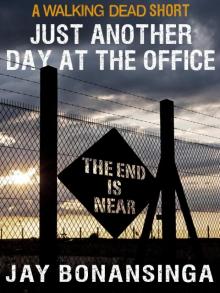 Just Another Day at the Office
Just Another Day at the Office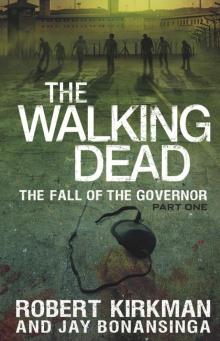 The Fall of the Governor: Part One
The Fall of the Governor: Part One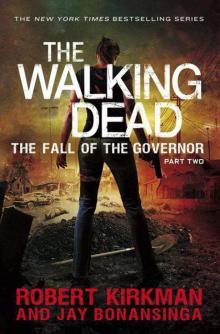 The Walking Dead: The Fall of the Governor: Part Two
The Walking Dead: The Fall of the Governor: Part Two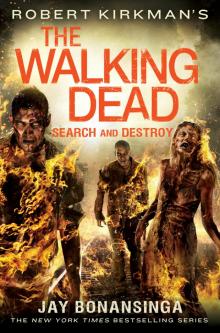 Search and Destroy
Search and Destroy Invasion
Invasion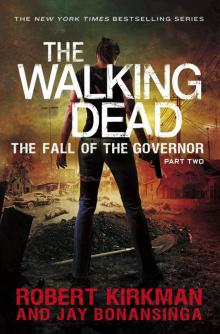 The Fall of the Governor: Part Two
The Fall of the Governor: Part Two The Walking Dead Collection
The Walking Dead Collection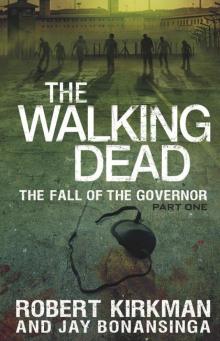 The Walking Dead
The Walking Dead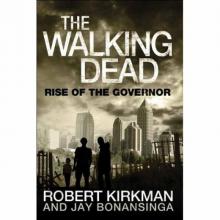 Descent
Descent The Walking Dead: Return to Woodbury
The Walking Dead: Return to Woodbury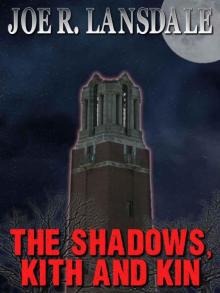 The Killer's Game
The Killer's Game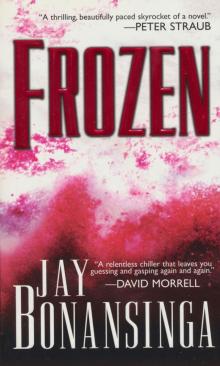 Frozen
Frozen Shattered
Shattered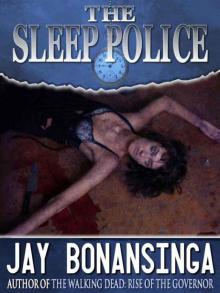 The Sleep Police
The Sleep Police Perfect Victim
Perfect Victim